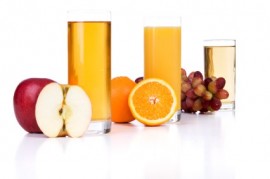
Juices
Juice not only offers hydration, great taste and refreshment; different juices offer a variety of vitamins, minerals, antioxidants and associated health benefits.
One-hundred per cent fruit juice is a great source of essential nutrients and phytonutrients. Research shows that people who drink 100% fruit juice have better quality diets than non-juice drinkers, and are more likely to meet dietary recommendations for vitamins A and C, folate, magnesium and potassium. In addition, 100% fruit juice drinkers eat more whole fruit than non-fruit juice drinkers, suggesting that 100% fruit juice is complementary with whole fruit intake. This is important given most Canadians are not eating the number of daily fruit and vegetables as recommended in Canada’s Food Guide.
Types of Juice Beverages
There are a number of terms associated with 100% juice and juice drinks that help determine the percentage of juice content and its form. Under packaging and labeling regulations, juices and diluted juice beverages are required to list the total percentage of juice content on the label.

100% pure or 100% juice
Juice that is directly squeezed from a fruit or vegetable. It can be made from juice concentrate that is reconstituted with water, and contain certain other ingredients such as vitamins or minerals.
Fruit Flavoured Juice Drink
Also referred to as cocktails or punch, these drinks contain less than 100% juice, and may contain sweeteners and water.
Pasteurized Juice
Juice that has been heated (pasteurized) before packaging to increase shelf life, ensure safety and minimize nutrient loss.
Chilled, Ready-to-Serve
Juice made from frozen concentrate or pasteurized juice. It is packaged in paper cartons, plastic or glass containers.
Reconstituted Juice from Concentrate
Juice that was manufactured as a frozen concentrate and later reconstituted.
Frozen Concentrate
This juice has been concentrated and frozen. Prior to consumption, it must be reconstituted with water per the instructions on the container.
Canned Juice
Fruit or vegetable juice that has been heated and sealed in cans to provide for an extended shelf life. Once opened, canned juice should be refrigerated in a container other than the can it came in, and consumed within one week.
Juice in TetraPak Containers
This is a shelf-stable product that requires no refrigeration. It is pasteurized juice or juice from concentrate, packaged in sterilized containers or preserved by a specific sterilization technique.